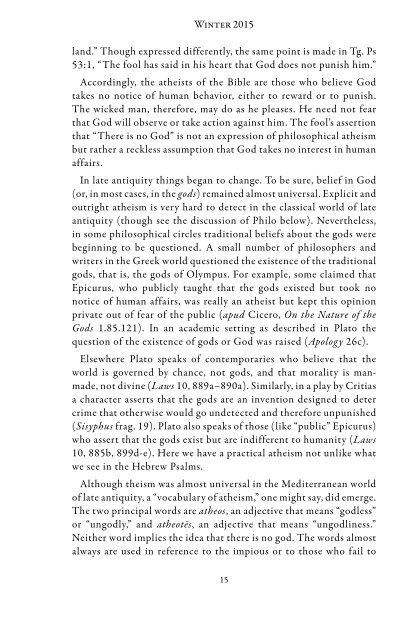THE CITY
h6c7p5d
h6c7p5d
You also want an ePaper? Increase the reach of your titles
YUMPU automatically turns print PDFs into web optimized ePapers that Google loves.
Winter 2015<br />
land.” Though expressed differently, the same point is made in Tg. Ps<br />
53:1, “The fool has said in his heart that God does not punish him.”<br />
Accordingly, the atheists of the Bible are those who believe God<br />
takes no notice of human behavior, either to reward or to punish.<br />
The wicked man, therefore, may do as he pleases. He need not fear<br />
that God will observe or take action against him. The fool’s assertion<br />
that “There is no God” is not an expression of philosophical atheism<br />
but rather a reckless assumption that God takes no interest in human<br />
affairs.<br />
In late antiquity things began to change. To be sure, belief in God<br />
(or, in most cases, in the gods) remained almost universal. Explicit and<br />
outright atheism is very hard to detect in the classical world of late<br />
antiquity (though see the discussion of Philo below). Nevertheless,<br />
in some philosophical circles traditional beliefs about the gods were<br />
beginning to be questioned. A small number of philosophers and<br />
writers in the Greek world questioned the existence of the traditional<br />
gods, that is, the gods of Olympus. For example, some claimed that<br />
Epicurus, who publicly taught that the gods existed but took no<br />
notice of human affairs, was really an atheist but kept this opinion<br />
private out of fear of the public (apud Cicero, On the Nature of the<br />
Gods 1.85.121). In an academic setting as described in Plato the<br />
question of the existence of gods or God was raised (Apology 26c).<br />
Elsewhere Plato speaks of contemporaries who believe that the<br />
world is governed by chance, not gods, and that morality is manmade,<br />
not divine (Laws 10, 889a–890a). Similarly, in a play by Critias<br />
a character asserts that the gods are an invention designed to deter<br />
crime that otherwise would go undetected and therefore unpunished<br />
(Sisyphus frag. 19). Plato also speaks of those (like “public” Epicurus)<br />
who assert that the gods exist but are indifferent to humanity (Laws<br />
10, 885b, 899d-e). Here we have a practical atheism not unlike what<br />
we see in the Hebrew Psalms.<br />
Although theism was almost universal in the Mediterranean world<br />
of late antiquity, a “vocabulary of atheism,” one might say, did emerge.<br />
The two principal words are atheos, an adjective that means “godless”<br />
or “ungodly,” and atheotēs, an adjective that means “ungodliness.”<br />
Neither word implies the idea that there is no god. The words almost<br />
always are used in reference to the impious or to those who fail to<br />
15


